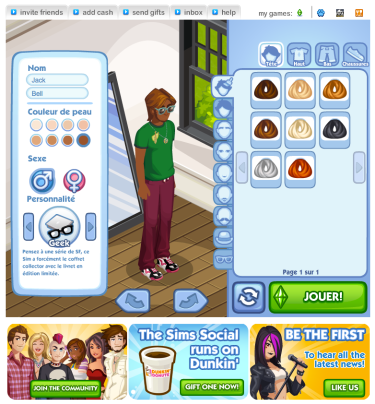
Electronic Arts’ newest social game looks like it will give Zynga — which hasn’t really faced any stiff competition in Facebook games — a run for its money. That’s because the game has a massive franchise and name behind it, along with a development team that has a pretty stellar track record. EA has sold more than 140 million copies of the The Sims and its sequels and expansion packs and has generated around $3 billion in revenue from it.
[aditude-amp id="flyingcarpet" targeting='{"env":"staging","page_type":"article","post_id":321763,"post_type":"story","post_chan":"none","tags":null,"ai":false,"category":"none","all_categories":"games,social,","session":"B"}']The Sims Social is basically a lightweight version of The Sims built into a browser on Facebook. The team behind The Sims and casual games maker Playfish both worked on the game. Electronic Arts bought Playfish in 2009 when it was vying with social games maker Zynga for the top social gaming spot. Zynga has since lurched ahead and claimed the top spot, with 253 million monthly active users compared to Electronic Arts’ 29 million monthly active users, according to AppData.
Since then, Zynga hasn’t faced a lot of competition from other social games makers. The next closest social gaming competitor is Wooga, which has around 32 million monthly active users. But it has never gone up against the likes of The Sims, which seems like a natural fit for Facebook.
AI Weekly
The must-read newsletter for AI and Big Data industry written by Khari Johnson, Kyle Wiggers, and Seth Colaner.
Included with VentureBeat Insider and VentureBeat VIP memberships.
The Sims was a smash hit with casual gamers because it was a very light game that was easy to get into and offered a lot of depth. You basically control a “sim” as it lives its life and try to achieve lifetime goals — which lets gamers accomplish whatever they want to do in the game. The games are known for having tongue-in-cheek humor and sharp writing.
Electronic Arts has not-so-quietly established a fierce casual and social gaming team. The company bought Playfish back in 2009 and also bought casual games maker PopCap for $750 million. Both teams have made successful games, and once the PopCap deal closes, there’s a good chance Playfish will be working with casual games maker PopCap.
VentureBeat's mission is to be a digital town square for technical decision-makers to gain knowledge about transformative enterprise technology and transact. Learn More